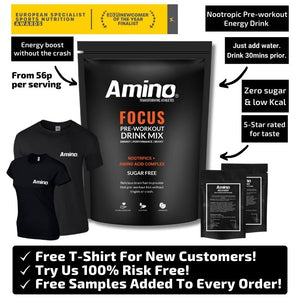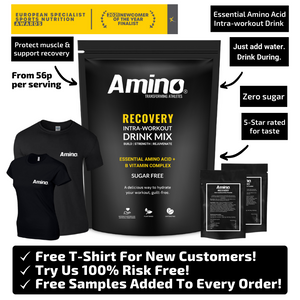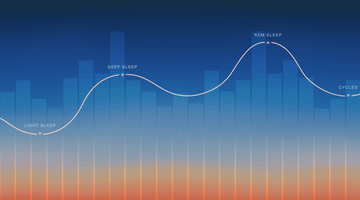If you're a cardio enthusiast looking to take your training to the next level, then you've probably considered how nutrition - and perhaps, protein intake - fits into the equation. In this article will help you learn why and when to use protein for cardio.

Whether it's running, cycling, swimming or HIIT classes, getting your nutrition right is key for maximizing those uplifting cardio sessions. Your protein intake may be the key! Proper protein timing can be just as important as hydration and carbs if you want results. Get clued up on your protein intake and get that heart rate up, you'll feel the difference!
How does protein work?
Protein is a macronutrient that plays a vital role in repairing and building muscle tissue. Therefore, it is essential for achieving success in the gym. It can enhance recovery and increase the intensity of your workout while reducing fatigue. Not to mention it helps regulate fluid balance so you stay hydrated while exercising and reduces fat storage while increasing lean muscle mass - helping you achieve a toned, defined body.
High-quality protein contains all nine essential amino acids (EAAs) that your body utilizes to replenish the protein lost by your muscles during exercise and mend the micro-tears that occur while working out. So by regularly consuming adequate amounts of protein before and after your workout sessions you can achieve your goals faster!
Several studies have shown that consuming 20-25g of protein in one sitting should give you around 2.2-2.7g of muscle-building essential amino acid (EAA) leucine, which is enough to trigger the muscle protein synthesis process. [1]
Related: What are amino acids and why do you need them?
Is protein good for cardio performance?
When it comes to cardiovascular performance, the right nutrition is essential. Protein during and after your workouts can help boost energy, endurance, and muscle repair.
But how exactly does protein contribute to cardiovascular performance? Essentially, protein acts as a source of fuel during workouts, helping to sustain your energy levels and allowing you to do longer and more intense exercise sessions. In contrast to carbohydrates, which get used up quickly during intense cardiovascular exercise, protein provides a more long-lasting source of energy.
In addition to fuelling your workouts, protein also aids in muscle repair and recovery. The amino acids found in protein help repair damaged muscle fibers after exercise, reducing recovery time and enabling you to get back to your workouts faster.
What type of protein should I use for cardio?
Whilst you can get protein from the food we eat during meals, it may not always be feasible or practical to consume the required amount of protein at the optimal time for digestion due to busy schedules and intense workout routines. Therefore, protein shakes and essential amino acid (EAA) supplements can be a great way to support the protein intake that you already get from your meals.
There are many different types of protein and amino acid supplements on the market, so it can be confusing to determine the right one for you. When it comes to protein, there are various options like whey, casein, and vegan sources such as soy, pea, rice and hemp. Amino acid supplements typically fall into two categories: BCAAs and EAA's. The key is to selecting supplement that is tailored to your specific needs and preferences.
Whey protein is the protein with the most leucine. About 25 grams of whey protein stimulates muscle protein synthesis maximally. Other proteins give you a little less leucine per 100 grams, which means you need more of it to get the same muscle-building effect. You need to eat 38 grams of pea protein, 40 grams of soy protein, or a whopping 54 grams of hemp protein to get the same anabolic effect as you get from 25 grams of whey protein. Animal proteins, like eggs, meat, poultry, dairy, and fish, provide more essential amino acids specifically leucine, than plant-based proteins.
Related: EAA vs Whey - Which is right for me?
Don't like a post-workout protein shakes? An EAA supplement like Amino RECOVERY (an intra-workout) might be the answer! Unlike other supplements that only provide three branched-chain amino acids (BCAAs), an EAA supplement has all nine essential amino acids absorbs faster into your system than protein. Numerous studies show this. [1]
Ultimately, the type of supplement you choose will depend on your personal preferences, dietary restrictions, and fitness goals.
Related: BCAA vs EAA - Which is better?
How much protein should I take?
So, how much protein should you be consuming for optimal cardiovascular performance? The recommended daily intake of protein depends on your body weight and activity level, but a general guideline: for athletes: 1.0-1.5g of protein per kg of weight daily, spread across 3-4 meals per day. And then for advanced training, injury, illness guidelines: 1.5-2.2g of protein per kg of weight daily.
And then aim for 20-25 grams of protein per serving, and consume it within within 20-30 minutes of your workout (the post-workout anabolic window) for optimal results. Ideally 1.5+ grams of leucine which can be provided in an amino acid complex like Amino RECOVERY during your workout or the post-workout anabolic window.
When is the best time to take protein? Before or after?
To get the most out of your supplementation, it's important to consume protein or amino acid supplements at the right time for you. Consuming protein in and around your workout (before, during and after) your workouts will help maximize results, accelerate muscle recovery, and reduce soreness. It's the best time to maximise the absorption of key nutrients and help with muscle recovery.
Ideally, the best time to take protein powder for cardio is right after your workout, within 30 minutes if possible. EAA supplements which don't need digesting can be taken pre-, intra- or -post workout supplements. So it really depends on what works best for you. You know your body best!
Related: Why the type of protein you consume can make a big difference
Protein powder and EAAs for cardio
Adding a protein powder or an EAA supplements to your diet can enhance your cardiovascular performance, regardless of whether you're a pro athlete or a recreational exerciser. By incorporating protein into your regimen, you can optimize your fitness objectives and achieve the most results possible.
Amino Drinks offer a variety of high-quality, plant-based amino acid supplements designed specifically for athletes and fitness enthusiasts. So if you're looking for a delicious and convenient way to take your cardio to the next level? Check out our FOCUS and RECOVERY pre- and post-workout drinks – great taste guaranteed!
Hydration and Carbohydrates for cardio
In addition to protein intake, hydration and carbohydrate consumption are also critical components for optimal cardiovascular performance. Staying hydrated is of utmost importance, especially during intense cardio sessions, as dehydration can lead to a decrease in performance and even cause muscle cramps.
To maintain proper hydration levels, it is recommended to drink water regularly throughout the day, and drink at least 450-600ml of water 2-3 hours before exercising, and 200-300ml of water every 10-20 minutes during the exercise session to maintain hydration, resulting in less than 2% bodyweight reduction. After exercise, Roberts (2012) recommends replacing weight with fluid at a rate of 150%. This equates to 1.5 litres of fluid for each kilogram of weight lost.
Carbohydrate rules are a little specific to you and the types of exercise you’re doing, so we'll do another article to address this. However generally speaking because Carbohydrates provide the energy needed for the body during cardio exercise it is important to consume sufficient carbohydrates before a cardio workout, as they will be used for fuel. Complex carbohydrates, such as whole grains, fruits, and vegetables, are ideal choices as they provide a steady release of energy throughout the workout.
During intense and prolonged cardio activity, quickly absorbed carbohydrates, such as sports drinks, can provide a quick source of energy to maintain performance. However, it is important to balance the intake of carbohydrates with the intensity and duration of the exercise, as too much can cause gastrointestinal discomfort.
Here is a great reference: Carbohydrate recommendations for athletes
Ultimately, proper hydration and carbohydrate intake, in addition to protein consumption, are crucial elements in achieving optimal cardio performance. By paying attention to your body's needs and fuelling it appropriately, you will be able to push yourself further and reach your fitness goals.
We hope you find this article useful. Got further questions? Ask our team. Simply email your questions to info@drinkamino.com and we will get them answered for you.
References
[1] https://www.ncbi.nlm.nih.gov/pmc/articles/PMC4913918/






